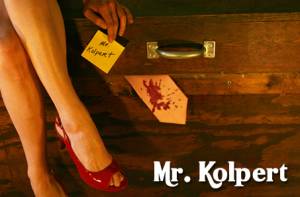NOT RECOMMENDED
When a play gets a 5-star review in London’s The Guardian yet fails to impress in an intimate Los Angeles production, one can’t help wondering, “What went wrong in the transatlantic transfer?”
Mr. Kolpert, German playwright David Gieselmann’s dark dark comedy, takes as its inspiration Alfred Hitchock’s classic film Rope, in which a pair of gay lovers commit a murder-for-thrill, hide the body in a trunk smack dab in the middle of their living room, then welcome unsuspecting guests to a party in said living room—only to be found out by an astute James Stewart.
In Gieselmann’s version, a cohabitating straight couple purportedly kill a certain Mr. Kolpert, hide him in a trunk smack dab in the middle of their living room, then invite one of Mr. Kolpert’s employees and her husband over for dinner and drinks in said living room. Unlike the murderous couple in Rope, however, Mr. Kolpert’s protagonists announce right away that they’ve committed murder, and that their victim is hidden inside that trunk…or is he? Did Ralf and Sarah actually commit murder, or is this all part of some sicko cat-and-mouse game they’ve thought up.
A pizza man’s arrival complicates matters considerably, and not simply because he’s brought the wrong order.
The biggest mistake made by producer Tommy French and director Mike Monroe is their attempt to transpose the play’s British English translation by David Tushingham into American vernacular. They’ve made the most obvious switches. “Bleeding” is not used as a swear word, “boot” has become “trunk,” “chips” are now “fries,” and prices are given in dollars rather than pounds. (Strangely, “cunt” remains, a word we Americans do use, but nowhere near as casually as the Brits, and certainly never to refer to a man.) Be that as it may, Americanizing a British English script is more than simply changing a word here or there. It requires an awareness that again and again, the lines in Tushingham’s translation are subtly but quite definitely not those the average American would say. The resulting script is just stilted enough to make it nigh-on impossible for even the best actor to sound natural, authentic, and spontaneous when saying them.
J.T. Arbogast (Bastian Mole), Kimberly Dilts (Edith), Tommy French (Ralf), Lauren Olipra (Sarah Kenner), and Adam Wasser (Pizza Man) do their utmost with the script they are given. Wasser comes across best. Olipra still seemed shaky with her lines on opening night. Justin McQuaig completes the cast in a small role.
The cast also has the disadvantage of performing in Fake Gallery, hands down the most audience-unfriendly theater in Los Angeles. There’s not a balcony seat that offers a less than extremely obstructed view—heads, metal bars, and fans (the mechanical kind) conspire against an acceptable field of vision. So much craning to see also limits concentration on what’s being said below. Seats downstairs may have been better, but seemed only marginally so. This gallery space is simply not an acceptable venue for a professional stage production.
Bob Ryan’s scenic design, Dan Tuttle’s lighting, and Shauna Madonado’s costumes are adequate considering the show’s budgetary limits. Bryan Danner is fight coordinator, Kelly Portier stage manager, and Destiny Ramsey house manager.
I can’t say that I had a horrible time at Mr. Kolper. Gieselman’s script has a deliciously dark humor which manages despite odds to engender laughter, some of it inspired by suddenly squirting blood and upchucked vomit. And since Mr. Kolpert runs only brisk hour and change, boredom is fortunately not an issue. Still, for someone who reviews somewhere between 20 and 30 productions each month, the vast majority of which are L.A. theater at its professional best, Mr. Kolpert falls far short of what any serious playgoer has the right to expect in this great theater town of ours.
MR. KOLPERT
Fake Gallery 323.644.4946, 4319 Melrose Ave. Los Angeles.
www.plays411.com/Kolpert
www.mrkolpert.com
–Steven Stanley
February 1, 2011



 Since 2007, Steven Stanley's StageSceneLA.com has spotlighted the best in Southern California theater via reviews, interviews, and its annual StageSceneLA Scenies.
Since 2007, Steven Stanley's StageSceneLA.com has spotlighted the best in Southern California theater via reviews, interviews, and its annual StageSceneLA Scenies.







 COPYRIGHT 2024 STEVEN STANLEY :: DESIGN BY
COPYRIGHT 2024 STEVEN STANLEY :: DESIGN BY